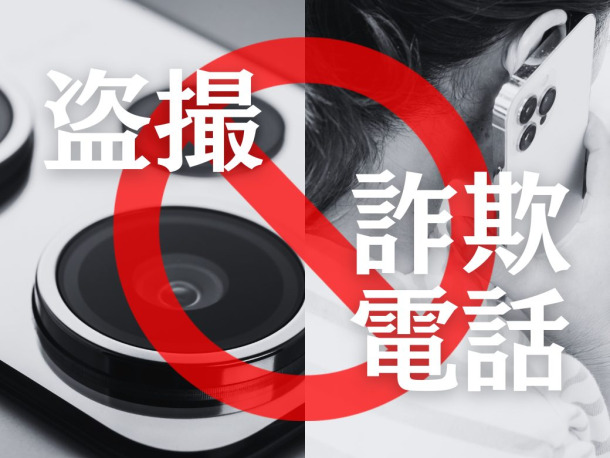
In recent years, the number of cases of "voyeurism" and "fraudulent phone calls" has been increasing in Japan. With the spread of smartphones and advances in communication technology, these crimes have become more commonplace and sophisticated, and students are no longer immune to them, with an increasing number of inquiries to universities. However, many people may be complacent, thinking, "There's no way I could become a victim." This time, the Waseda Weekly Reporter (SJC student staff) visited Waseda Legal Clinic, a law firm, and spoke with attorneys Yasuhiro Konishi and Ayako Miyano about the current state of these crimes and countermeasures. Let's consider together how we should deal with voyeurism and fraudulent phone calls.
Interview with Waseda Legal Clinic
We spoke to two of our lawyers!
Waseda Legal Clinic
Yasuhiro Konishi, Attorney at Law
After graduating from the Faculty of Economics at Keio University, he worked as a company employee before completing Waseda Law School School. He joined Waseda Legal Clinic in 2023. Academic Advisor at the Waseda Law School from 2024.
Attorney Ayako Miyano
Graduated from School of Law of Waseda University and completed Waseda Law School at Waseda University. After working at Kitasenju Public Law Office, a public law firm specializing in criminal cases, she joined Waseda Legal Clinic in 2024.
Waseda Weekly Reporter
Nishimura Nagisa, 3rd year School of Culture, Media and Society
Suhon Kanai, second-year student School of Law
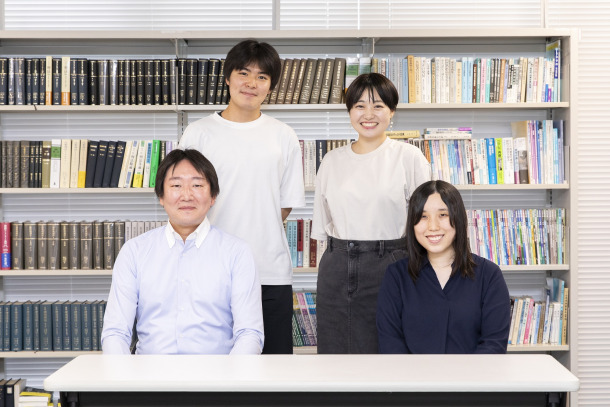
(Front row, from left) Attorney Konishi, Attorney Miyano, (back row, from left) Kanai and Nishimura. At Waseda Legal Clinic Building No. 28, Waseda Campus
[Voyeurism] Learn about the main cases and countermeasures for the crime of "voyeurism" and its impact
Case 1: While on an escalator, I felt a presence right behind me and when I turned around, I saw the man holding a smartphone directly under my skirt.
Case 2: A small camera covered by clothing was installed on a shelf in the changing room.
Case 3: The smartphone camera's zoom function was used to take secret photos from a distance.
Nishimura: What should we do if we become a victim of voyeurism on campus?
Miyano: First, if you have time to observe the perpetrator, check the facial features and clothing of the person suspected of taking the secret photo. It is possible to make an arrest without the involvement of law enforcement, but the perpetrator may become enraged, so your own safety should be your top priority. If you feel in danger, move a little away from the perpetrator or move towards a more crowded area, and call out for help from those around you. If you are able to apprehend the perpetrator on the spot with the help of a friend, security guard, or someone nearby, call the police immediately.
Even if the perpetrator runs away, in the case of a voyeurism, if you can describe the perpetrator's face, clothing, or other characteristics, or if the perpetrator is captured on a security camera, this can provide clues for the police investigation. Evidence such as voyeur images may also remain on the smartphone used by the perpetrator to take the photos, and in some cases the perpetrator may be caught even after some time has passed, so it is best to consult with your faculty office or the police.
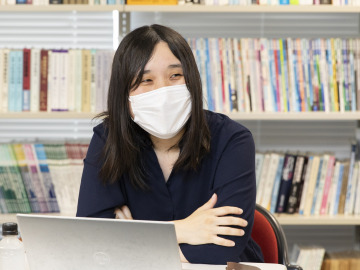
Attorney Miyano
Nishimura: Are there many cases where the perpetrator is not caught and people are forced to accept the situation? Also, what happens if the person who took the photos deletes the evidence from their smartphone?
Miyano: There may be cases where the victim is unaware that they are being secretly photographed, and even if they are aware, if they are not arrested on the spot, there may be no evidence from security cameras on trains or elsewhere, and unfortunately there may be cases where the culprit cannot be caught. However, even if the images have been deleted, the police or other investigative agencies may be able to analyze the smartphone and restore the photos, so it is a good idea to consult the police.
Establishment of the crime of filming: Voyeurism is a crime! Even attempted filming can be punished
Konishi: Starting in July 2023, a new law will be enacted making it illegal to take photographs of people (*1). Until then, voyeurism had been regulated by each prefecture's anti-nuisance ordinance, but there were issues with the scope of regulations and penalties differing from region to region. With the establishment of the crime of taking photographs, heavier penalties will be imposed uniformly across the country compared to previous violations of the ordinance, so I think it has also clarified the positioning of "voyeurism as a crime, not a nuisance." Furthermore, the scope of the regulation of the crime of taking photographs is not limited to voyeurism; it also applies to cases where a person takes photographs of a victim's sexual parts against their will, such as by intoxicating the victim, threatening them, or suppressing their resistance.
*1 Punishment established by the enforcement of the "Act on Punishment of Acts of Filming Sexual Poses, etc. and on the Deletion of Electromagnetic Records Related to Images of Sexual Poses Recorded in Seized Items," commonly known as the "Act on Punishment of Filming Sexual Poses, etc." Violators are subject to a maximum of three years in prison or a fine of up to 3 million yen.
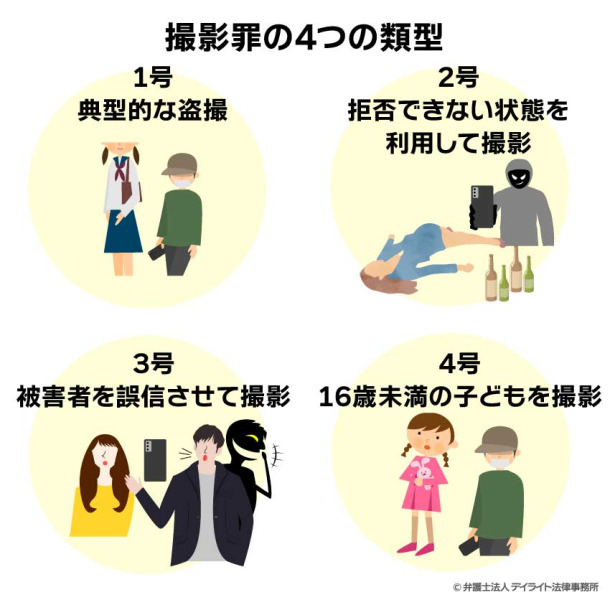
Illustration provided by: Daylight Law Office
Furthermore, the Act on Punishment of Sexual Photography, etc. newly stipulates the crimes of providing secretly taken images to a third party, the crime of storing them with the intent to provide them, and the crime of recording them knowing that they are secretly taken.
Miyano: It's possible to be punished for the crime of taking pictures even if the act of taking a voyeuristic photograph is unsuccessful. For example, in Case 1, if the victim notices before the shutter button is pressed, or in Case 2, if the user notices a small camera recording in a changing room and reports it, even if nothing is captured, there's a high possibility that the crime of taking pictures will be established. Regarding Case 3, regarding the zoom function of the camera, in principle, if you take a picture of someone fully clothed in the city or on campus, you won't be charged with taking pictures of a "sexual pose" if you're attempting to take a picture of a person's intimate parts or underwear that can be seen through the gaps in their clothes, and so you could be charged with a crime. Taking pictures of a person's face doesn't qualify as a "sexual pose, etc.", but it's still an offensive act, and even if it doesn't result in criminal trouble, it could lead to civil trouble, so you shouldn't do it.
A casually uploaded photo leads to unexpected trouble
Konishi: With the spread of smartphones and social media, the barrier to taking photos has dropped dramatically compared to a few decades ago, and I feel like people no longer feel reluctant to share photos and videos with friends. As a result, people may take photos of "sexual poses" out of curiosity or for fun and share them with friends. Furthermore, if the social media account is private, people may upload the photos thinking that only their friends will see them. While private accounts are only visible to specific followers, there is also the possibility that one of those followers could take a screenshot and upload it to a public account. Once you upload information to social media, even for just a moment, you should know that you can no longer control it, and so please respond with imagination and a strong sense of crisis.
Nishimura: It's true that Instagram has a "Shita Tomo(したとも)" feature (a feature that lets you share photos with close friends), and people tend to upload photos without hesitation, thinking that it won't be a problem if they're only sharing this information with this group of people. Although it wasn't a case of voyeurism, I've heard of cases where unexpected images were leaked and people got into trouble with their friends.
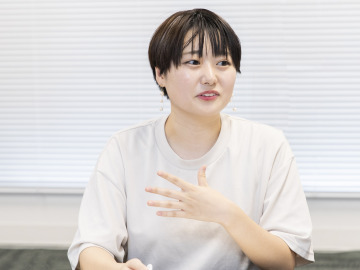
[Fraudulent phone calls] Major cases and self-protection tips
Case 1: You receive a call from a representative of the police, either from the main number of a real police station (a spoofed caller number) or from an international phone number beginning with +1 or +44, claiming to be from the police. The caller will approach you via social media or a communication app under the pretext of questioning you, saying something like, "We suspect you of being the perpetrator and would like to confirm your identity."
Case 2: Mainly Chinese students receive phone calls from individuals claiming to be officials from public institutions such as the Chinese Embassy, the Chinese Public Security Bureau, or the Immigration Services Agency. They say things like, "An account in your name is being used for a crime," or "You have received fraudulent mail in your name," and get the recipient to download a communication app. They then show a fake arrest warrant over a video call and demand a large sum of money, saying, "If you don't want to be arrested, you must pay." (*2)
Always check calls from unknown numbers
Kanai: It seems that the most common pattern is to impersonate someone in a public position, such as the police or public security.
Konishi: In recent years, there has been a sharp increase in frauds in which people impersonate official figures to defraud people of their money, but no matter what position the scammers are impersonating, the fact remains that they are lying to defraud people of their money. In addition to official figures, they also impersonate different roles depending on the situation, sometimes children, sometimes financial institutions, etc. Therefore, rather than being wary of calls from people in official positions, it is important to be suspicious of calls from unknown people in the first place. If the caller is claiming to be someone in an official position, all you need to do is ask for the number and the name of the person in charge, check if it is a real number, and then call back.
The telephone has long been said to be one of the "three sacred tools of fraud" (bank accounts in other people's names, telephones in other people's names, and call lists). Because you can't see the person on the other end of the phone, and you have to imagine the lies the scammer is telling you, it's a tool that can easily lead to errors in objective judgment. Furthermore, scammers will keep saying all sorts of things to keep you from hanging up, preventing you from making a rational decision.
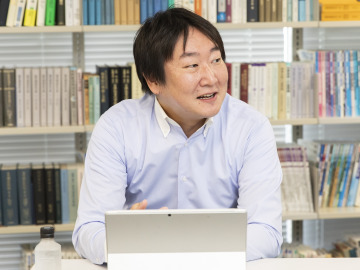
Attorney Konishi
Since scams are ultimately about money, the topic of money will inevitably come up at some point. If the topic of money comes up during a phone call, try to think calmly for a moment, "Why is this person talking to me about money when they've never met me?" It's strange that someone you've never met is talking about money.
Kanai: Actually, I did receive a scam call pretending to be from the police. Before I knew it, I had received three calls... I checked the number and it was from a police station in Osaka, so I was shocked, but when I told a friend, he said, "That sounds like a scam." Just to be sure, I went to the police station and asked for advice, and he told me to just ignore it. In the end, nothing happened, but I was surprised that these calls really happen.
Konishi: One way to do this is to not answer calls from unknown phone numbers. They take advantage of the psychological tendency to think that it's bad manners not to call back.
Kanai: It's true that I currently live in Tokyo, but I think I would have called back if the number had been for a police station in Tokyo rather than from Osaka.
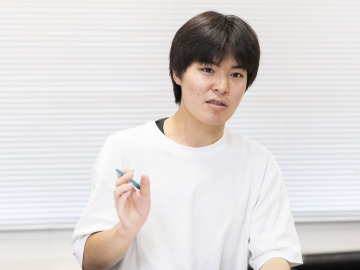
Miyano: The classic method is making fraudulent phone calls, but criminal groups are constantly coming up with new methods, adapting to the times. From the once rampant "it's me" scams where people pretend to be your child or grandchild, to refund scams for medical expenses and pensions, and even scams where people pretend to be the police, trends change every few years and become more sophisticated, so I think it's difficult to see a decrease in the number of people being deceived.
How can we protect ourself from fraud?
Kanai: I think that new criminal methods are constantly being devised, and this is not limited to phone scams. How can we protect ourselves?
Konishi: It's important to know the modus operandi of each crime, but I think that in the first place, you should be genuinely suspicious of receiving contact from a stranger, or suddenly receiving a phone call informing you of a crime while you're living a peaceful life. Even if you're a university student, anyone over the age of 18 is treated as an adult, so they need to hone their judgment and think clearly so they can protect themselves.
Miyano: With the revision of the Civil Code, university students are now considered adults, but they still need to be protected. If you have even the slightest suspicion that something is wrong, such as "This happened, but I wonder if it's strange?", don't be afraid to talk to an adult around you. Whether it's a friend, a teacher, or the police, I hope you will always make it a point to talk to someone first.
Interview and text: Kumpei Kuwamoto
Photography: Chihiro Hashimoto
How did you feel after completing the interview?
Nishimura:
This was the first time I'd heard about the crime of taking photos, but I think it's a good thing that stricter penalties will help spread awareness that taking secret photos is a crime. I was also surprised to hear that people are becoming less resistant to taking photos and posting them on social media with limited access. When it comes to scam phone calls, I try to stay calm and take a step back and think, "Why is this call coming to me?"
Kanai-san
With the spread of smartphones, everyone now has small cameras that can take hidden camera shots, and I feel that we need to be more responsible and aware of the dangers. I learned that when it comes to fraud, it's not enough to just understand the current cases and be on guard. I'll try to be more vigilant, thinking that "at some point, the conversation will inevitably turn to money."
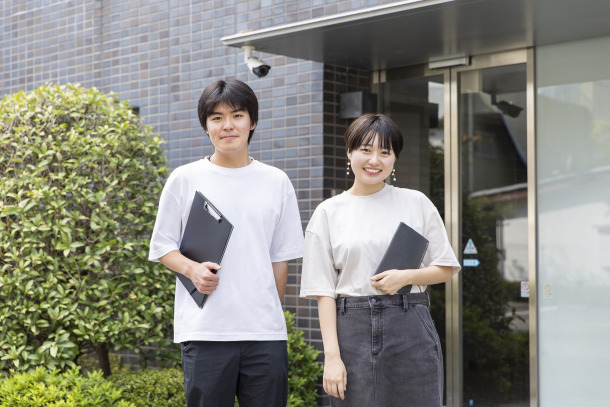
Waseda Legal Clinic
This law firm was established with the aim of becoming the legal equivalent of a "university hospital." While operating as a law firm that provides high-quality legal services, it also plays the role of an educational institution that provides educational opportunities for students with the aim of educating them in clinical law. Many of its lawyers are involved in legal education at Waseda University.
〒169-0051 東京都新宿区西早稲田1丁目1番7号 早稲田キャンパス 28号館 4階
TEL:03-5272-8156
Webサイト:https://www.waseda-legalclinic.com/
[Next Focus Preview] "Tokorozawa Campus Festival" Special Feature Released on Monday, October 13th

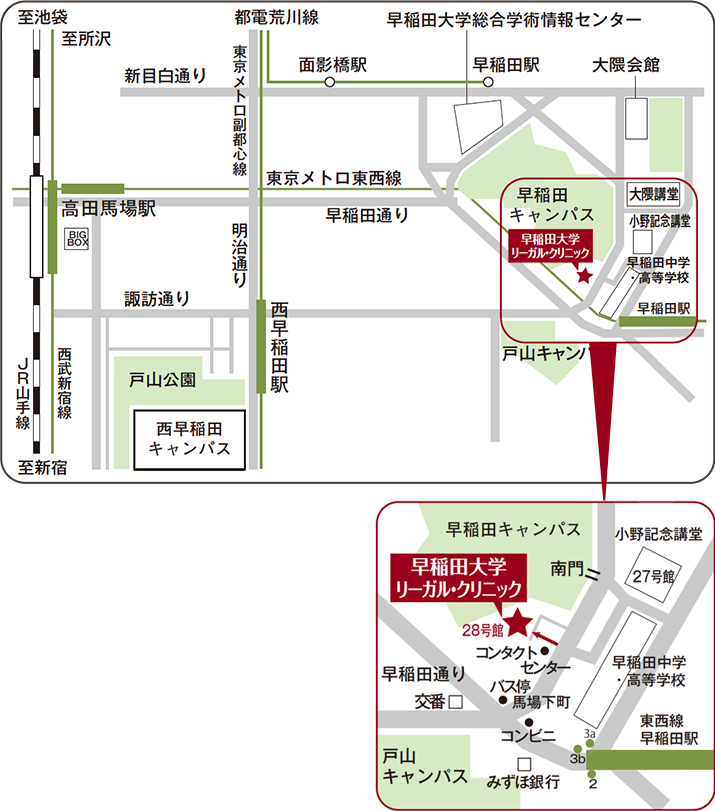
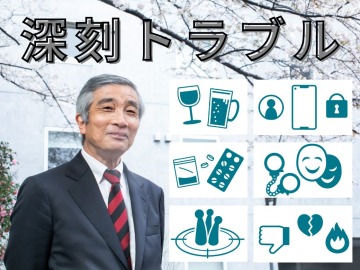
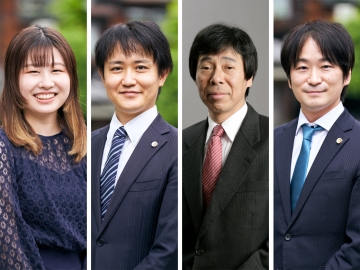
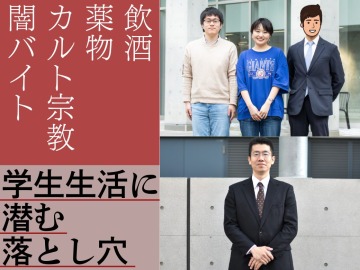


![[Save version] Map of the four main campuses](https://www.waseda.jp/inst/weekly/assets/uploads/2025/09/17cb2975123fc5103172ef60bd98608d-610x458.jpg)

